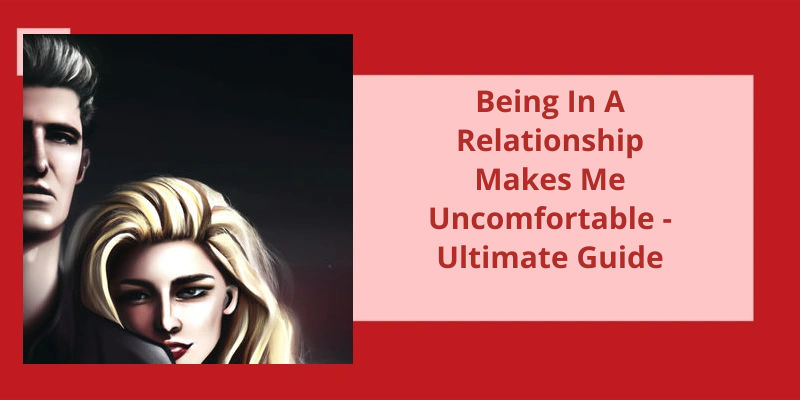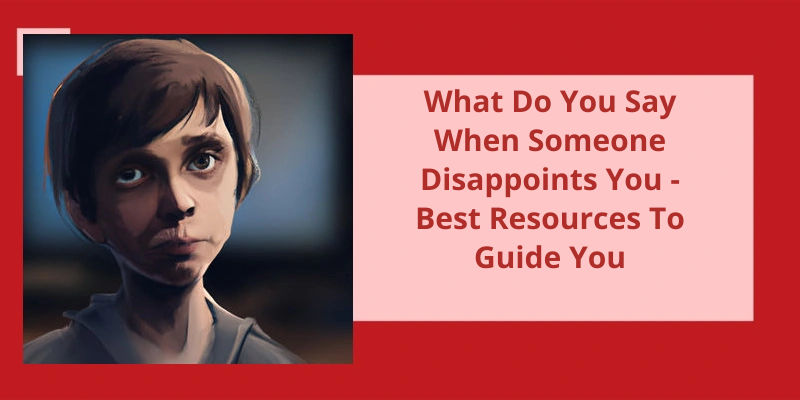Navigating the realm of relationships can be an overwhelming and intricate journey for many individuals. While society often portrays being in a relationship as the epitome of happiness and fulfillment, it’s crucial to acknowledge that not everyone feels comfortable or content in this particular aspect of life. For those who experience discomfort or unease when it comes to relationships, it’s essential to understand that these feelings are valid and should be explored, rather than dismissed. In this ultimate guide, we will delve into the reasons behind why being in a relationship may make some people uncomfortable, debunk societal expectations surrounding relationships, and provide practical tips and advice for individuals who find themselves grappling with these feelings. Whether you’re someone who currently experiences discomfort in relationships or are seeking to better understand and support a loved one, this comprehensive guide aims to offer a compassionate and insightful perspective on this often misunderstood topic.
Why Do I Feel So Uncomfortable in a Healthy Relationship?
Why do I feel so uncomfortable in a healthy relationship? It’s a question that many individuals find themselves asking as they navigate the complexities of romantic partnerships. While it’s natural to experience some level of discomfort when embarking on a new relationship, it’s important to recognize that this discomfort isn’t necessarily indicative of a problem. In fact, feeling uncomfortable in a healthy relationship can be a sign of growth and personal development.
Like any major life adjustment, entering into a relationship can bring a range of emotions and challenges. It’s normal to feel uncertain or even anxious as you navigate the nuances of sharing your life with another person. However, it’s crucial to remember that discomfort doesn’t equate to a lack of compatibility or potential for happiness.
Just as physical growth can result in physical discomfort, personal growth within the context of a relationship can lead to emotional discomfort. This discomfort is often a sign that you’re stretching your boundaries, pushing yourself to confront and address any underlying fears or insecurities.
Instead of resisting this discomfort, it can be incredibly beneficial to embrace it and see it as an opportunity for self-discovery and personal growth. Lean into the discomfort and allow yourself to explore the underlying reasons for your unease. Are there past experiences or traumas that are surfacing? Is there a fear of vulnerability or loss that needs to be addressed?
By confronting and addressing these discomforts head-on, you can begin to cultivate a deeper understanding of yourself and your emotional needs. It’s important to communicate openly and honestly with your partner about your feelings and concerns. This can foster a sense of connection and understanding, as well as provide a supportive environment in which both partners can grow and thrive.
It’s a sign that you’re engaging in personal growth and self-awareness. Embrace the discomfort, communicate openly, and allow yourself the space to grow and evolve within the context of your relationship. With time and patience, you may find that your discomfort subsides, replaced with a deep sense of love, connection, and fulfillment.
Building Healthy Boundaries and Coping Mechanisms in a Relationship
- Recognizing and respecting personal boundaries
- Open and honest communication
- Setting clear expectations
- Understanding each other’s needs
- Self-reflection and self-awareness
- Encouraging independence and individuality
- Managing disagreements effectively
- Establishing time for self-care
- Seeking professional help when needed
These attachment difficulties can lead to fear of abandonment or a fear of intimacy, making it challenging to trust and fully invest in a romantic relationship. Additionally, previous heartbreaks or betrayals can create a fear of being hurt again, leading to anxiety and uneasiness in relationships. It’s important to explore these underlying causes and work on building self-confidence and trust in order to have a healthy and fulfilling relationship.
Why Do I Feel Uneasy About Being in a Relationship?
Feeling uneasy about being in a relationship is a common experience for many individuals. It’s important to recognize that this discomfort can stem from a variety of underlying causes. One possible factor contributing to relationship anxiety is emotional neglect or abuse experienced in the past. These negative experiences can deeply impact ones self-esteem and self-worth, making it difficult to trust and feel secure within a romantic partnership.
Past trauma is another contributing factor to discomfort in relationships. Traumatic experiences can profoundly affect ones ability to trust and feel safe in close connections. The fear of being hurt or abandoned can lead individuals to question the authenticity and stability of their relationship, causing them to feel uneasy and anxious.
Furthermore, individuals with a history of codependency may also experience relationship anxiety. Codependency is often characterized by a strong need for approval and validation from others, leading to a fear of rejection.
Understanding these underlying factors can help individuals navigate the challenges of relationship anxiety and work towards developing healthier and more secure connections with their partners.
When it comes to being in a healthy relationship, it isn’t uncommon for some individuals to feel a sense of discomfort or unease. This discomfort may stem from various factors, including fear of intimacy or a lack of trust. For those who’ve never desired closeness with others, this discomfort can be intensified by a subconscious fear of emotional vulnerability and the potential for pain or being overwhelmed by investing too much in a relationship. It’s essential to recognize that these feelings are normal and may indicate a need for personal growth and understanding in order to cultivate healthier relationships.
Why Does Being in a Healthy Relationship Make Me Uncomfortable?
Some individuals may find themselves feeling uncomfortable in a healthy relationship due to a variety of reasons. One possible explanation is a fear of intimacy, which can manifest as a discomfort with getting emotionally close to another person. This fear may stem from past experiences or a lack of trust in others. The idea of opening up and being vulnerable with someone may feel daunting and overwhelming, leading to discomfort.
Past heartbreaks or disappointments can leave a lasting impact, causing individuals to subconsciously push intimacy away as a defense mechanism. They may fear that investing too much of themselves in a relationship could lead to pain or rejection, so they distance themselves emotionally.
Additionally, some individuals may simply have a preference for independence and autonomy. They may feel more comfortable when they’ve sole control over their own lives and decisions, and the idea of relying on someone else or merging their lives with another person can be unsettling. This preference for autonomy may make it challenging for them to fully embrace the idea of being in a healthy relationship.
It’s also worth considering that societal expectations and pressures can play a role in feeling uncomfortable in a relationship. Society often idealizes romantic relationships and places a heavy emphasis on finding “the one.”. This can create unrealistic expectations and fears of not living up to societal standards, further contributing to the discomfort.
Lastly, personal insecurities and self-doubt can contribute to feeling uncomfortable in a relationship. Individuals may question their worthiness of love and worry that they aren’t deserving of a healthy, committed partnership.
Overall, feeling discomfort in a healthy relationship isn’t uncommon or abnormal. It’s essential to recognize and understand the underlying reasons for these feelings in order to address them effectively. Open communication with a trusted partner or seeking professional help can provide valuable insights and support in navigating these emotions and building a healthier relationship.
It can be daunting for individuals who value their independence and have concerns about losing their personal freedom. Additionally, past experiences might have shaped a fear of vulnerability or commitment, making it challenging to envision themselves thriving in a relationship. These internal conflicts can create a sense of unease and a lingering feeling that being in a relationship may not be the right path for them.
Why Do I Feel Like I Shouldn’t Be in a Relationship?
Why do I feel like I shouldnt be in a relationship? This is a question that many individuals grapple with, as they find themselves hesitant to dive into the realm of romantic partnerships. For some, the reluctance stems from a perceived loss of freedom and independence. Being in a relationship can mean adjusting ones daily routines and activities to accommodate the needs and desires of another person. This notion can be overwhelming and unsettling, as it may feel like surrendering personal autonomy.
Moreover, a relationship encompasses compromise and collaboration, which can be challenging for those who cherish their individuality and are accustomed to making decisions solely for themselves. The idea of constantly considering another persons needs and wishes can create a sense of unease and discomfort. It requires a level of selflessness and adaptability that may not come naturally to everyone.
Another factor contributing to the discomfort some individuals feel about being in a relationship is the fear of losing oneself within the dynamics of partnership. They may worry that their own identity, interests, and aspirations may be overshadowed or compromised by the needs and desires of their partner. This fear is rooted in the belief that being in a relationship means sacrificing personal goals or dreams, which can lead to a sense of dissatisfaction and regret.
Additionally, past experiences and traumas can play a significant role in shaping ones aversion to relationships. If someone has been hurt or betrayed in the past, they may develop a fear of intimacy and vulnerability. The fear of getting hurt again can create a strong desire to avoid relationships altogether, as a means of self-preservation. This wariness can manifest as a general discomfort or apprehension towards the idea of entering into a romantic partnership.
It’s important to note, however, that these feelings of discomfort and hesitation towards relationships aren’t inherently negative or abnormal. They’re valid emotions that warrant exploration and understanding. Recognizing and confronting these feelings can be a crucial step towards determining what one truly desires and needs in terms of personal fulfillment and happiness. Ultimately, each individuals journey is unique, and it’s essential to prioritize self-awareness and self-care when navigating the complexities of relationships.
The Role of Self-Esteem and Self-Worth in Experiencing Discomfort in Relationships.
- Self-esteem and self-worth play a significant role in experiencing discomfort in relationships.
- When individuals have low self-esteem, they may doubt their own worth and struggle with feelings of inadequacy, which can lead to discomfort in their relationships.
- Low self-worth can make it difficult for individuals to believe that they deserve love and connection, causing them to push away their partners or sabotage their relationships.
- Furthermore, individuals with low self-esteem may constantly seek validation from their partners, leading to a codependent dynamic and further discomfort in the relationship.
- On the other hand, individuals with high self-esteem may also experience discomfort in relationships.
- They may have high expectations for themselves and their partners, and when these expectations aren’t met, they may feel disappointed or dissatisfied with the relationship.
- Moreover, individuals with high self-esteem may struggle with vulnerability and opening up emotionally, which can hinder the development of deep and meaningful connections in relationships.
- It’s important to note that self-esteem and self-worth are influenced by various factors, including past experiences, upbringing, and societal influences.
- Working on improving self-esteem and self-worth can be beneficial for individuals experiencing discomfort in relationships.
- By fostering a positive self-image and learning to value oneself, individuals can enhance their overall well-being and have healthier and more fulfilling relationships.
Source: I feel like I shouldn’t have gotten into a relationship in the …
This fear can also be rooted in a fear of vulnerability and the potential for emotional pain. Past experiences can shape our beliefs and expectations about love and relationships, leading us to build walls and guard our hearts. It’s important to acknowledge and address these fears in order to create healthier and more fulfilling relationships in the future.
Why Do I Feel So Scared of Getting Into a Relationship?
When it comes to getting into a romantic relationship, some individuals may find themselves feeling extremely uncomfortable and hesitant. This fear of entering into a relationship can stem from past traumatic experiences with previous partners. The pain and hurt caused by infidelity, betrayal, or heartbreak can leave a lasting impact on an individuals ability to trust and open up emotionally.
These negative experiences can create a deep fear of falling in love again, as the person may be afraid of going through the same pain and heartache once more. The fear acts as a self-preservation mechanism, trying to protect the person from potential harm in the future.
It’s important to note that it’s not just romantic relationships that can contribute to this fear. Traumatic experiences in parental relationships and even close friendships can also play a role in developing a fear of intimacy. These past experiences may have created a sense of vulnerability and fear of being hurt again, making it difficult to trust others and form new connections.
If you find yourself experiencing this fear of getting into a relationship, it’s crucial to take the time to heal from past wounds and address any unresolved emotional issues. Seek support from trusted friends, family, or professionals who can help you process and work through these experiences. Through therapy, self-reflection, and healing, it’s possible to overcome these fears and develop healthier and more fulfilling relationships in the future. Remember, you deserve love and happiness, and with time and effort, you can overcome your fear of falling in love.
Conclusion
In conclusion, navigating the uncharted waters of being in a relationship can undoubtedly be a daunting and uncomfortable experience for many individuals. From facing vulnerability and opening up emotionally to dealing with the fear of intimacy and commitment, there are numerous factors that contribute to the discomfort associated with relationships. However, by taking the time to understand ourselves, communicate effectively, set boundaries, and prioritize personal growth, we can gradually overcome these discomforts and foster healthier, more fulfilling connections with our partners. Remember, being uncomfortable isn’t necessarily a sign of incompatibility but rather an opportunity for personal growth and deeper connection. With patience, self-reflection, and a willingness to step outside our comfort zones, we can embrace the vulnerability and uncertainty that comes with relationships and ultimately thrive in them.






